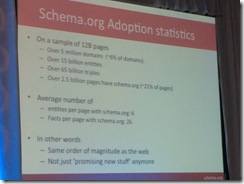 Regular readers of this blog may well know I am an enthusiast for Schema.org – the generic vocabulary for describing things on the web as structured data, backed by the major search engines Google, Bing, Yahoo! & Yandex. When I first got my head around it back in 2011 I soon realised it’s potential for making bibliographic resources, especially those within libraries, a heck of a lot more discoverable. To be frank library resources did not, and still don’t, exactly leap in to view when searching the web – a bit of a problem when most people start searching for things with Google et al – and do not look elsewhere.
Regular readers of this blog may well know I am an enthusiast for Schema.org – the generic vocabulary for describing things on the web as structured data, backed by the major search engines Google, Bing, Yahoo! & Yandex. When I first got my head around it back in 2011 I soon realised it’s potential for making bibliographic resources, especially those within libraries, a heck of a lot more discoverable. To be frank library resources did not, and still don’t, exactly leap in to view when searching the web – a bit of a problem when most people start searching for things with Google et al – and do not look elsewhere.
Schema.org as a generic vocabulary to describe most stuff, easily embedded in your web pages, has been a great success.  As was reported by Google’s R.V. Guha, at the recent Semantic Technology and Business Conference in San Jose, a sample of 12B pages showed approximately 21% containing Schema.org markup. Right from the beginning, however, I had concerns about its applicability to the bibliographic world – great start with the Book type, but there were gaps the coverage for such things as journal issues & volumes, multi-volume works, citations, and the relationship between a work and its editions. Discovering others shared my combination of enthusiasm and concerns, I formed a W3C Community Group – Schema Bib Extend – to propose some bibliographic focused extensions to Schema.org. Which brings me to the events behind this post…
As was reported by Google’s R.V. Guha, at the recent Semantic Technology and Business Conference in San Jose, a sample of 12B pages showed approximately 21% containing Schema.org markup. Right from the beginning, however, I had concerns about its applicability to the bibliographic world – great start with the Book type, but there were gaps the coverage for such things as journal issues & volumes, multi-volume works, citations, and the relationship between a work and its editions. Discovering others shared my combination of enthusiasm and concerns, I formed a W3C Community Group – Schema Bib Extend – to propose some bibliographic focused extensions to Schema.org. Which brings me to the events behind this post…
The SchemaBibEx group have had several proposals accepted over the last couple of years, such as making the [commercial] Offer more appropriate for describing loanable materials, and broadening of the citation property. Several other significant proposals were brought together in a package which I take great pleasure in reporting was included in the latest v1.9 release of Schema.org. For many in our group these latest proposals were a long time coming after their initial proposal. Although frustrating, the delays were symptomatic of a very healthy process.
Our proposals to add hasPart, isPartOf, exampleOfWork, and workExample to the CreativeWork Type will be available to many, as CreativeWork is the superclass to many types in many areas. Our proposals for issueNumber on PublicationIssue and volumeNumber on PerodicalVolume are very similar to others in the vocabulary, such as seasonNumber and episodeNumber in TV & Radio. Under Dan Brickley’s careful organisation, tweaks and adjustments were made across a few areas resulting in a consistent style across parts of the vocabulary underpinned by CreativeWork.
Although the number of new types and properties are small, their addition to Schema opens up potential for much better description of periodicals and creative work relationships. To introduce the background to this, SchemaBibEx member Dan Scott and I were invited to jointly post on the Schema.org Blog.
So, another step forward for Schema.org. I believe that is more than just a step however, for those wishing to make the bibliographic resources more visible on the Web. There as been some criticism that Schema.org has been too simplistic to be able represent some of the relationships and subtleties from our world. Criticism that was not unfounded. Now with these enhancements, much of these criticisms are answered. There is more to do, but the major objective of the group that proposed them has been achieved – to lay the broad foundation for the description of bibliographic, and creative work, resources in sufficient detail for them to be understood by the search engines to become part of their knowledge graphs. Of course that is not the final end we are seeking. The reason we share data is so that folks are guided to our resources – by sharing, using the well understood vocabulary, Schema.org.
 Examples of a conceptual creative work being related to its editions, using exampleOfWork and workExample, have been available for some time. In anticipation of their appearance in Schema, they were introduced into the OCLC WorldCat release of 194 million Work descriptions (for example: http://worldcat.org/entity/work/id/1363251773) with the inverse relationship being asserted in an updated version of the basic WorldCat linked data that has been available since 2012.
Examples of a conceptual creative work being related to its editions, using exampleOfWork and workExample, have been available for some time. In anticipation of their appearance in Schema, they were introduced into the OCLC WorldCat release of 194 million Work descriptions (for example: http://worldcat.org/entity/work/id/1363251773) with the inverse relationship being asserted in an updated version of the basic WorldCat linked data that has been available since 2012.

RT @DataLiberate: A Step for http://t.co/415kzBxEFR – A Leap for Bib Data on the Web http://t.co/wU9FCo8zcJ #schema.org #bibex #linkeddata…
A Step for http://t.co/DKycn3xSPT – A Leap for Bib Data on the Web http://t.co/PH45fyva7W
A Step for http://t.co/dC0OhfMXIV – A Leap for Bib Data on the Web by Richard Wallis @rjw http://t.co/XAehX6WcdF
RT @Catalogablog: A Step for http://t.co/B2m2IgNKov – A Leap for Bib Data on the Web by Richard Wallis @rjw http://t.co/VIWoPcMMF9
RT @Catalogablog: A Step for http://t.co/dC0OhfMXIV – A Leap for Bib Data on the Web by Richard Wallis @rjw http://t.co/XAehX6WcdF
RT @yo_bj: RT @Catalogablog: A Step for http://t.co/B2m2IgNKov – A Leap for Bib Data on the Web by Richard Wallis @rjw http://t.co/VIWoPcMM…
RT @yo_bj: RT @Catalogablog: A Step for http://t.co/B2m2IgNKov – A Leap for Bib Data on the Web by Richard Wallis @rjw http://t.co/VIWoPcMM…
RT @Catalogablog: A Step for http://t.co/dC0OhfMXIV – A Leap for Bib Data on the Web by Richard Wallis @rjw http://t.co/XAehX6WcdF
#schema.org Support for Bibliographic Relationships and Periodicals – http://t.co/YxwwMlZye3 @rjw @denials See also: http://t.co/KuwsTLx3M0
RT @aaranged: #schema.org Support for Bibliographic Relationships and Periodicals – http://t.co/YxwwMlZye3 @rjw @denials See also: http://t…
RT @aaranged: #schema.org Support for Bibliographic Relationships and Periodicals – http://t.co/YxwwMlZye3 @rjw @denials See also: http://t…
RT @yo_bj: RT @Catalogablog: A Step for http://t.co/B2m2IgNKov – A Leap for Bib Data on the Web by Richard Wallis @rjw http://t.co/VIWoPcMM…
RT @Catalogablog: A Step for http://t.co/dC0OhfMXIV – A Leap for Bib Data on the Web by Richard Wallis @rjw http://t.co/XAehX6WcdF
RT @aaranged: #schema.org Support for Bibliographic Relationships and Periodicals – http://t.co/YxwwMlZye3 @rjw @denials See also: http://t…
RT @DataLiberate: A Step for http://t.co/415kzBxEFR – A Leap for Bib Data on the Web http://t.co/wU9FCo8zcJ #schema.org #bibex #linkeddata…
RT @DataLiberate: A Step for http://t.co/415kzBxEFR – A Leap for Bib Data on the Web http://t.co/wU9FCo8zcJ #schema.org #bibex #linkeddata…
RT @DataLiberate: A Step for #Schema.org – A Leap for Bib Data on Web http://t.co/oEFoeBjgEX #bibex #linkeddata #libraries – for Europe⌚️
RT @rjw: RT @DataLiberate: A Step for #Schema.org – A Leap for Bib Data on Web http://t.co/oEFoeBjgEX #bibex #linkeddata #libraries – for…
RT @rjw: RT @DataLiberate: A Step for #Schema.org – A Leap for Bib Data on Web http://t.co/oEFoeBjgEX #bibex #linkeddata #libraries – for…
@rjw Good stuff! @DataLiberate
RT @rjw: RT @DataLiberate: A Step for #Schema.org – A Leap for Bib Data on Web http://t.co/oEFoeBjgEX #bibex #linkeddata #libraries – for…
“on a sample of 12B pages, 21% contained http://t.co/YpkspQ9j9K markup” (Dan Brickley @danbri at SemTech) via
http://t.co/0WOrrSyLHS
RT @FrankVanHarmele: “on a sample of 12B pages, 21% contained http://t.co/YpkspQ9j9K markup” (Dan Brickley @danbri at SemTech) via
http:…
RT @rjw: RT @DataLiberate: A Step for #Schema.org – A Leap for Bib Data on Web http://t.co/oEFoeBjgEX #bibex #linkeddata #libraries – for…
A Step for http://t.co/ciw2PafBCJ – A Leap for Bib Data on the Web (@rjw) http://t.co/PbmCRcy1TK
Step for #Schema.org – A Leap for Bib Data on Web http://t.co/1DVPhHwR1P #bibex #linkeddata #libraries – for Europe⌚️
RT @FrankVanHarmele: “on a sample of 12B pages, 21% contained http://t.co/H7CoJQI3ys markup” @danbri at SemTech
http://t.co/EeCaKDKrmC
RT @Catalogablog: A Step for http://t.co/dC0OhfMXIV – A Leap for Bib Data on the Web by Richard Wallis @rjw http://t.co/XAehX6WcdF
RT @FrankVanHarmele: “on a sample of 12B pages, 21% contained http://t.co/YpkspQ9j9K markup” (Dan Brickley @danbri at SemTech) via
http:…
RT @FrankVanHarmele: “on a sample of 12B pages, 21% contained http://t.co/YpkspQ9j9K markup” (Dan Brickley @danbri at SemTech) via
http:…
RT @FrankVanHarmele: “on a sample of 12B pages, 21% contained http://t.co/YpkspQ9j9K markup” (Dan Brickley @danbri at SemTech) via
http:…
A Step for http://t.co/MTn5FGHpuJ – A Leap for Bib Data on the Web | Data Liberate http://t.co/8CljZleEPZ, see more http://t.co/iQkQ1L2vf1
A Step for http://t.co/zb2rqS4ui2 – A Leap for Bib Data on the Web | Data Liberate http://t.co/kr8EDLSdq5, see more http://t.co/1IqoMON3XW
RT @blognoon: A Step for http://t.co/MTn5FGHpuJ – A Leap for Bib Data on the Web | Data Liberate http://t.co/8CljZleEPZ, see more http://t.…
RT @DataLiberate: A Step for http://t.co/415kzBxEFR – A Leap for Bib Data on the Web http://t.co/wU9FCo8zcJ #schema.org #bibex #linkeddata…
@DanielMiessler I thought you might have an opinion on this http://t.co/660BlPjcx4 #schema
RT @ALA_TechSource: A Step for http://t.co/PReiNodjlc – A Leap for Bib Data on the Web | Data Liberate http://t.co/YpAwEibRnz
RT @sieverts: A Step for http://t.co/cyqawjLPjP – A Leap for Bib Data on the Web http://t.co/pWlF9Pmbus